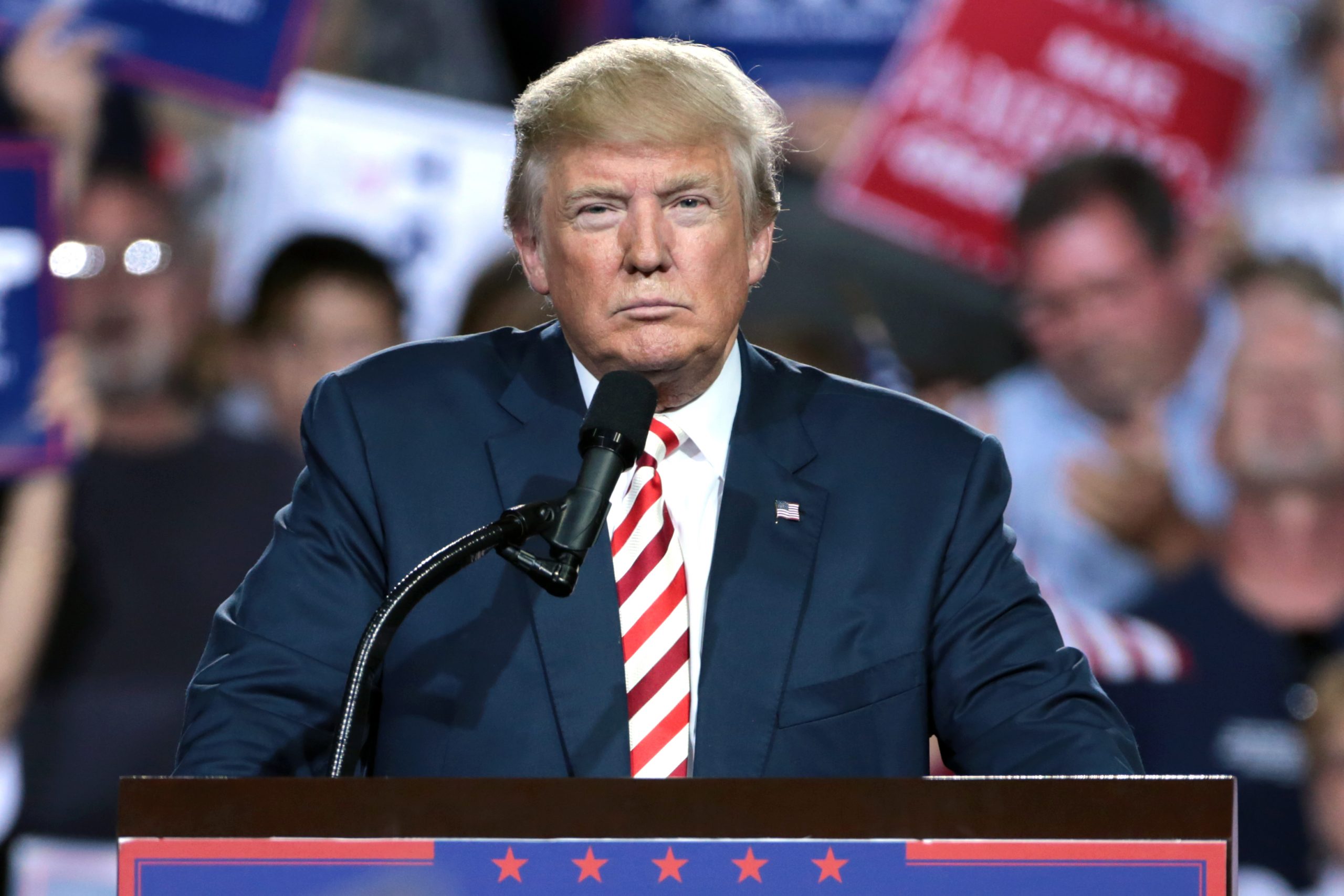The growing likelihood of an unhinged Donald Trump returning to power and acting on his threats to withdraw the United States from NATO should serve as a wake-up call for Europe. Instead of hoping for the best, European countries must boost their military spending and establish a robust defense union.
LONDON – Donald Trump’s potential return to the White House in 2025 poses a grave threat to Europe’s security. With war in Ukraine still raging, European countries must shore up their defenses against Russian President Vladimir Putin’s revanchist aggressions before it is too late.
The prospect of an unrestrained and unhinged Trump acting on his threats to abandon the United States’ historic commitment to Europe’s defense is so alarming to most European leaders that they appear to be in denial. But after decisive victories in the Iowa caucuses and New Hampshire primary, Trump is now almost certain to be the Republican Party’s presidential nominee in November’s election. Given that he also leads President Joe Biden in national polls and in many battleground states, his return to power is a real and present danger.
During his first term, Trump repeatedly threatened to withdraw the US from NATO, the military alliance that ensures that the US extends its nuclear umbrella to Europe. He was talked out of it by his senior foreign-policy advisers, notably former National Security Adviser John Bolton. But Trump’s increasingly isolationist rhetoric suggests that, if elected again, he will surround himself with yes-men rather than experienced establishment figures.
While Trump needs congressional approval to withdraw from NATO, he can gut American security guarantees without abandoning the alliance formally. He would merely need to declare that the US would not come to the defense of European countries in the event of an attack. And now he has said just that: far from defending a NATO country that came under Russian attack, he would “encourage” Russia “to do whatever the hell they want” if he deemed that the NATO ally in question had not spent enough on defense.
Instead of merely hoping for a best-case scenario in which Biden is re-elected and continues to support Ukraine and uphold America’s defense commitments to its NATO allies, Europe must prepare for the worst. Ideally, these preparations should have started much sooner, either after Putin annexed Crimea in 2014 or following Trump’s election in 2016.
Had the groundwork for a European defense union within NATO been laid a decade ago, the European Union could now be benefiting from the advantages of enhanced collaborative defense research and a more efficient military-procurement strategy. At the very least, more European governments should have followed Poland and Estonia’s lead and greatly increased their defense budgets in the two years since Russia’s invasion of Ukraine.
While it is impossible to turn back the clock, failure to act now would be the height of irresponsibility. For starters, Europe must step up its support for the Ukrainian war effort. With the Republican majority in the US House of Representatives refusing Biden’s request for an additional $60 billion in military aid for Ukraine, that embattled country is running low on weapons and ammunition.
Fortunately, the EU has finally approved a four-year €50 billion ($54 billion) aid package for Ukraine that Hungary’s pro-Putin Prime Minister Viktor Orbán had blocked in December.
Europe should also pledge to support Ukraine for the long haul, even if the US no longer will. If Orbán refuses to go along, the other 26 member states must bypass him and provide Ukraine with the resources it needs.
By now, it is abundantly clear that if Russia is not defeated in Ukraine, Putin will attack other European countries. Already, the Kremlin is working to destabilize European democracies by funding far-right and far-left anti-EU parties and deploying a legion of bots to spread election disinformation on social media. Meanwhile, Putin-backed hackers are targeting critical infrastructure such as electricity grids and government databases, and Russian fighter jets violate Swedish and Estonian airspace.
Consequently, Europe must also boost its defense spending. At a minimum, European countries must meet NATO’s 2%-of-GDP target. In February 2022, German Chancellor Olaf Scholz declared a Zeitenwende (turning point) in the country’s foreign policy, signaling a renewed commitment to rearmament. But nearly two years later, he has yet to follow through on his promise to invest €100 billion in modernizing the country’s armed forces. Notably, Germany’s defense spending is projected to have reached only 1.2% of GDP in 2023.
More EU funding is also needed. Thierry Breton, the bloc’s commissioner for the internal market, has recently proposed establishing a €100 billion EU defense fund to finance joint defense procurement and ramp up production of arms and ammunition. Breton’s proposal – which likely has the support of French President Emmanuel Macron, his close ally – represents a promising first step.
Given that Europe’s economy dwarfs Russia’s, EU countries could easily produce enough weapons to meet both Ukraine’s defense needs and their own. But since such investments take time and require a sustained commitment from national governments, there is no time to waste.
To be sure, Russia possesses a huge nuclear arsenal. By contrast, only two European countries have nuclear weapons: France and the United Kingdom (which is no longer part of the EU and heavily relies on American technology). Given that Putin has already threatened to use tactical nuclear weapons in Ukraine, Europe must develop its own nuclear deterrence strategy. But this would require a credible commitment from both France and the UK to use their nuclear capabilities to defend countries like Estonia and Poland.
More controversially, countries that find themselves without the protection of the US nuclear umbrella may feel compelled to acquire their own nuclear arsenals. Ukraine, having surrendered the nuclear weapons that remained on its soil following the dissolution of the Soviet Union, has learned the hard way that security assurances are not enough to deter potential Russian attacks.
Every country with nuclear-power plants and the necessary scientific know-how has the capacity to develop its own weapons relatively quickly. France, moreover, could offer to share its technological expertise with other European countries.
European rearmament may seem drastic, but the stakes are existential. With June’s European Parliament elections fast approaching, defense should be at the top of voters’ minds.




LONDON – Donald Trump’s potential return to the White House in 2025 poses a grave threat to Europe’s security. With war in Ukraine still raging, European countries must shore up their defenses against Russian President Vladimir Putin’s revanchist aggressions before it is too late.
The prospect of an unrestrained and unhinged Trump acting on his threats to abandon the United States’ historic commitment to Europe’s defense is so alarming to most European leaders that they appear to be in denial. But after decisive victories in the Iowa caucuses and New Hampshire primary, Trump is now almost certain to be the Republican Party’s presidential nominee in November’s election. Given that he also leads President Joe Biden in national polls and in many battleground states, his return to power is a real and present danger.
During his first term, Trump repeatedly threatened to withdraw the US from NATO, the military alliance that ensures that the US extends its nuclear umbrella to Europe. He was talked out of it by his senior foreign-policy advisers, notably former National Security Adviser John Bolton. But Trump’s increasingly isolationist rhetoric suggests that, if elected again, he will surround himself with yes-men rather than experienced establishment figures.
While Trump needs congressional approval to withdraw from NATO, he can gut American security guarantees without abandoning the alliance formally. He would merely need to declare that the US would not come to the defense of European countries in the event of an attack. And now he has said just that: far from defending a NATO country that came under Russian attack, he would “encourage” Russia “to do whatever the hell they want” if he deemed that the NATO ally in question had not spent enough on defense.
Instead of merely hoping for a best-case scenario in which Biden is re-elected and continues to support Ukraine and uphold America’s defense commitments to its NATO allies, Europe must prepare for the worst. Ideally, these preparations should have started much sooner, either after Putin annexed Crimea in 2014 or following Trump’s election in 2016.
Had the groundwork for a European defense union within NATO been laid a decade ago, the European Union could now be benefiting from the advantages of enhanced collaborative defense research and a more efficient military-procurement strategy. At the very least, more European governments should have followed Poland and Estonia’s lead and greatly increased their defense budgets in the two years since Russia’s invasion of Ukraine.
While it is impossible to turn back the clock, failure to act now would be the height of irresponsibility. For starters, Europe must step up its support for the Ukrainian war effort. With the Republican majority in the US House of Representatives refusing Biden’s request for an additional $60 billion in military aid for Ukraine, that embattled country is running low on weapons and ammunition.
Fortunately, the EU has finally approved a four-year €50 billion ($54 billion) aid package for Ukraine that Hungary’s pro-Putin Prime Minister Viktor Orbán had blocked in December.
Europe should also pledge to support Ukraine for the long haul, even if the US no longer will. If Orbán refuses to go along, the other 26 member states must bypass him and provide Ukraine with the resources it needs.
By now, it is abundantly clear that if Russia is not defeated in Ukraine, Putin will attack other European countries. Already, the Kremlin is working to destabilize European democracies by funding far-right and far-left anti-EU parties and deploying a legion of bots to spread election disinformation on social media. Meanwhile, Putin-backed hackers are targeting critical infrastructure such as electricity grids and government databases, and Russian fighter jets violate Swedish and Estonian airspace.
Consequently, Europe must also boost its defense spending. At a minimum, European countries must meet NATO’s 2%-of-GDP target. In February 2022, German Chancellor Olaf Scholz declared a Zeitenwende (turning point) in the country’s foreign policy, signaling a renewed commitment to rearmament. But nearly two years later, he has yet to follow through on his promise to invest €100 billion in modernizing the country’s armed forces. Notably, Germany’s defense spending is projected to have reached only 1.2% of GDP in 2023.
More EU funding is also needed. Thierry Breton, the bloc’s commissioner for the internal market, has recently proposed establishing a €100 billion EU defense fund to finance joint defense procurement and ramp up production of arms and ammunition. Breton’s proposal – which likely has the support of French President Emmanuel Macron, his close ally – represents a promising first step.
Given that Europe’s economy dwarfs Russia’s, EU countries could easily produce enough weapons to meet both Ukraine’s defense needs and their own. But since such investments take time and require a sustained commitment from national governments, there is no time to waste.
To be sure, Russia possesses a huge nuclear arsenal. By contrast, only two European countries have nuclear weapons: France and the United Kingdom (which is no longer part of the EU and heavily relies on American technology). Given that Putin has already threatened to use tactical nuclear weapons in Ukraine, Europe must develop its own nuclear deterrence strategy. But this would require a credible commitment from both France and the UK to use their nuclear capabilities to defend countries like Estonia and Poland.
More controversially, countries that find themselves without the protection of the US nuclear umbrella may feel compelled to acquire their own nuclear arsenals. Ukraine, having surrendered the nuclear weapons that remained on its soil following the dissolution of the Soviet Union, has learned the hard way that security assurances are not enough to deter potential Russian attacks.
Every country with nuclear-power plants and the necessary scientific know-how has the capacity to develop its own weapons relatively quickly. France, moreover, could offer to share its technological expertise with other European countries.
European rearmament may seem drastic, but the stakes are existential. With June’s European Parliament elections fast approaching, defense should be at the top of voters’ minds.